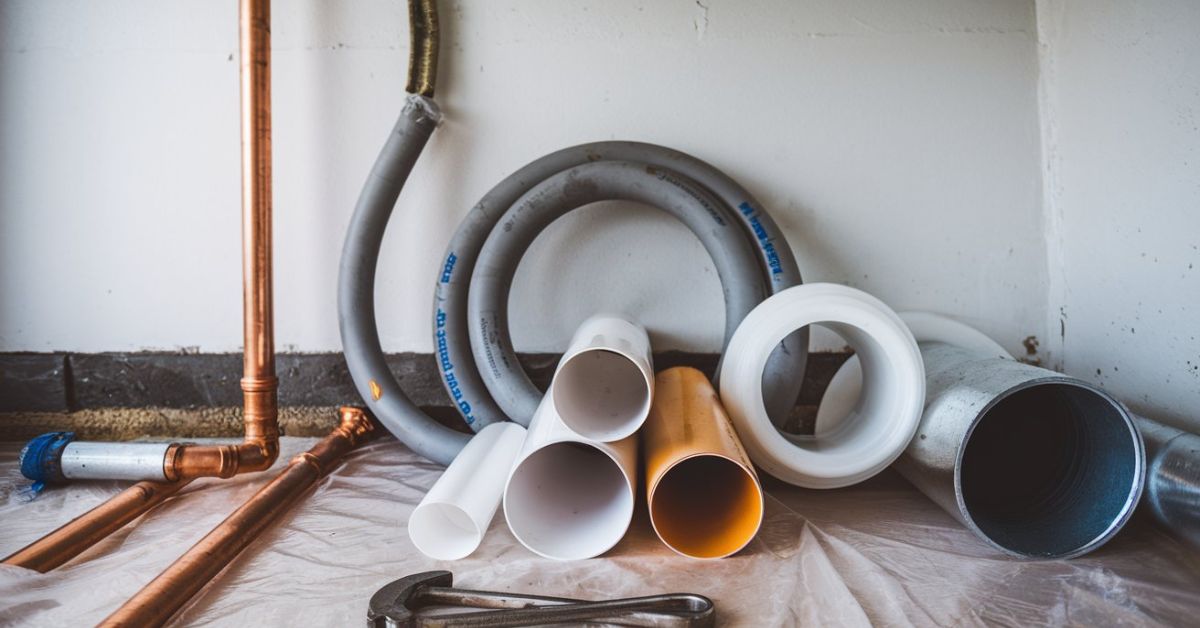What is the Standard Plumbing Material?
What is the Standard Plumbing Material? Plumbing materials are the backbone of any sound plumbing system, whether in a residential home or a large commercial building. Choosing suitable plumbing materials ensures not only the longevity of the plumbing system but also its efficiency and safety. If you want to understand plumbing, you’re in the right place! We will dive deep into the various types of standard plumbing materials, their benefits, and why they are essential for your next project. Oh, and if you get confused, please get in touch with us at +966597747661 or email us at mechgroup.ksa@gmail.com.
The Basics of Plumbing Materials

Before discussing specific materials, such as plumbing and why they matter, they refer to the pipes, fittings, and fixtures carrying water, gas, or waste through a building. They play an essential role in delivering clean water to what’s needed and safely disposing of waste.
Imagine trying to sip water through a straw with holes—annoying. That’s precisely what happens when the wrong or substandard plumbing materials are used. So, getting it right the first time can save you from many headaches (and leaks) later on.
The Main Types of Plumbing Materials
Discuss the material you’ll encounter when setting up or fixing a plumbing system. Each material has pros and cons, so choosing based on your needs is essential. The most common materials are:
- Copper
- PEX (Cross-linked Polyethylene)
- PVC (Polyvinyl Chloride)
- CPVC (Chlorinated Polyvinyl Chloride)
- Galvanized StWe’ll cover these below, starting with the trusty copper and working our way through to galvanized steel. Rea et’ set’s dig in!
Copper: The Timeless Classic
Copper is like “he, “grandpa,” and” her” of plumbing materials—reliable, durable, and around forever. It’s often considered the gold standard for piping. This material has been used for decades due to its corrosion resistance and ability to handle extreme temperatures.
One reason copper pipes remain popular is their longevity. They can last over 50 years (longer than your average dog or goldfish). Copper is also resistant to bacteria, making it ideal for drinking water systems.
On the downside, copper pipes can be expensive and not the most flexible, so installation sometimes requires more work than other materials. But copper might be worth the investment if you want your pipes to last as long as your house.
PEX: The Flexible Wonder
Next up is PEX, Copper’ ser’s fantastic, flexible cousin. PEX (short for cross-linked polyethylene) is a new plumbing material that is quickly becoming a favorite. Why? It’s affordable and easy to install.
Imagine having to twist and turn copper pipes through the walls of a house. It’s not fun. But that’s not a problem. Its flexibility allows it to easily navigate corners, making it a top choice for professionals and DIY enthusiasts. Plus, it can connect copper pipes using adapters, which is convenient.
However, it isn’t the fault. It doesn’t have direct sunlight, and it is for outdoor use. Also, it is resistant to chemicals but can still be susceptible to damage in extreme conditions.
PVC: The Budget-Friendly Opt. You’ve probably heard of PVC (polyvinyl chloride), especially if you’ve ever gone down the plumbing aisle at a hardware store. One of the most common plumbing materials used today, mainly because it is affordable and lightweight.
PVC pipes are generally used for drainage systems and vent piping because they resist chemicals that aren’t easy to work with because they’re. They can be cut to size using simple tools.
But PVC does have limitations. It doesn’t have hot water and is rarely used for water supply. It’s also more fragile than materials like PEX, which makes it more likely to crack under extreme pressure or freezing temperatures.
CPVC: The Hot Water Hero
CPVC (Chlorinated Polyvinyl Chloride) is lPVC’s lPVC sibling. It has many of the same benefits as regular PVC, but it can handle hot water. It is designed to withstand higher temperatures, making it suitable for hot and cold water applications.
It is a little more expensive than regular PVC but still more affordable than coppIt’sIt’s also lightweight and relatively easy to install. However, like PVC, it c n be brittle in cold temperatures, it’sit’s no so it’sfor areas prone to freezing.
Galvanized Steel: The Old-Timer
Lastly, we have galvanized steel. This material was once the go-to choice for water supply lines but is not as popular today. Galvanized steel pipes are made from steel and coated with zinc to prevent corrosion. They are solid and durable, so they were used in homes built before the 1960s.
However, the zinc coating can wear off, leading to rust and potential water contamination. It’s also a heavy material, which can make installation tricky. Many professionals replace old galvanized pipes with modern materials like PEX or copper.
Choosing the Right Plumbing Material for Your Project
Now twe’vee’ve that we’vee main types of plumbing materials, how do you choose the right one for your needs? Well, it depends on several factors:
- Budget
- Application (hot water or cold water)
- Durability
- Ease of insFor easeatioinstallation, you’re budget, PVC might.be your best bet for drainage systems, while PEX offers flexibility and ease of installation for water supply lines. CPVC or copper is the way to go—you’ euro—You’ reth ot water.
Of course, you can always contact a professional plumber or consult us at Mech Group to ensure you select suitable materials. You can email us at mec group.ksa@gmail.com or check out our LinkedIn profile at Mech Group on LinkedIn.
The Importance of Quality Plumbing Materials
Why is choosing a suitable plumbing material so important? The last thing you want is a system that breaks down prematurely. Using high-quality materials ensures the longevity of your plumbing system and helps prevent costly repairs.
Cheap materials might save you money upfront, but they could cost you much more in the long run when they fail and need to be replaced. As the saying goes, “Buy cheap, buy tw” ce.
Points to Remember
Here are a few key points to keep in mind when choosing plumbing materials:
- Durability: How long do you want your plumbing system to last?
- Application: Is the material suitable for hot, cold, or both?
- Cost: Does the material fit your budget, both now and in the future?
- Installation: Are you hiring a professional, or is this a DIY project?
- Safety: Does the material meet local building codes and health standards?
A sound plumbing system starts with suitable materials. If you’re still wondering if the material is best for your project, please call us at +966597747661 or visit our website, Mech Group, for expert advice.


I’m more than happy to discover this website. I wanted to thank
you for ones time for this fantastic read!! I definitely really liked every part
of itt and I have you book marked to see new
stuff on yoour web site. https://Lvivforum.pp.ua/
I’m mor than happy tto discover this website. I wanted to thank
you for ones tie for this fantastioc read!! I definitely really liked every part of it and I hasve you
book marked tto see new sguff on your web site. https://Lvivforum.pp.ua/